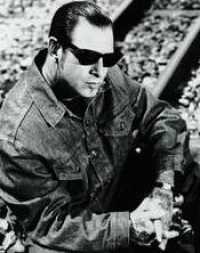After years leading seminal punk band Social Distortion, Mike Ness ventured his first solo record, Cheating at Solitaire, in 1999. He was born in 1962 in Lynn, Massachusetts; his family relocated to Orange County, California later that year and he grew up roaming the streets of Fullerton. As a boy his heroes were not athletes or politicians; they were gangsters and guitar players. By the time Mike was a teen he would be playing in a garage band that would profoundly impact the American Punk Rock movement. But long before he ever heard the Ramones, the Clash or the Sex Pistols - bands that would eventually play a major role in his music - Ness grew up listening to early rock and roll.
Johnny Cash, the Rolling Stones, Woodie Guthrie and Creedence Clearwater Revival marked Ness'early years. He was especially inspired by American roots music; his earliest influences were the pioneers of rock and roll, musicians that were scandalous and rebellious in their day. The musicianship of the bands and the revolutionary spirit at their core appealed to Ness. While the radical, rebellious aspect would become his calling card, Mike never lost the love of his musical roots.
Punk rock music defined a dissatisfied youth culture of the early eighties just as rock and roll had done two decades before. Reacting to mainstream ideals, punk rockers were hostile, seeking to challenge those ideals. Orange County played heavily in the developing movement. The music was loud, hard, fast and anti-social and Social Distortion was at its core. Making their way from Los Angeles clubs to national tours, from underground recordings to substantial commercial success, Social Distortion developed a loyal following that has lasted nearly twenty years.
The music was ground breaking. It was pure angst and it challenged certain stereotypes set by the English brand of the genre. With uncompromising intensity, Mike brought a working class spirit to his songs. He recognized that the outcast nature of punk rock was similar in spirit to that of other dissatisfied groups and began to identify his punk music with the working class. Mike exposed the effects of a complacent culture, reacted to society's actions and challenged the norm.
When Social Distortion began, Mike Ness was seventeen years old. The first albums are indicative of a young artist, acutely focused on the kind of music that was meaningful to him during that period. As Mike matured as a songwriter and musician, his work would begin to incorporate a whole body of influences. As early as 1981, Social Distortion did an infamous version of the Rolling Stones' "Under My Thumb." Over the years the band paid homage to many of Mike's early influences including Johnny Cash, Elmore James, and Hank Williams. Today, Cheating At Solitaire explores the full spectrum of all his influences.
Cheating At Solitaire Mike Ness shows another side of himself with Cheating At Solitaire. The new album incorporates the raw power and social relevance that has always marked his music, while embracing many of the defining styles in American rock and roll history. Produced by Ness and James Saez, the album is a home for some of Mike's best work to date. It integrates punk, rockabilly, primitive rock and roll, country and blues and maintains the energy that typifies Mike Ness. Rock legend Bruce Springsteen and rockabilly (and now swing) great Brian Setzer each contribute to cuts on the album. Guest appearances from Veikko, Mando and Daniel from Royal Crown Revue add a jazz feel to many of the tunes.
Cheating At Solitaire also has a definite dark side, which looks at inner conflicts and the soul, exposing a sensitive side of Mike's songwriting. The 14 tracks on the album are at the same time diverse and congruent and never stray from the staple hard edge that has always been Mike's signature. Cheating At Solitaire is the product of a versatile and developed singer/songwriter.
"Don't Think Twice" is the album's lead track. Written by Bob Dylan, Mike nods at the folk rock hero with a playful yet rebellious remake of his classic song. He claims the song for his own with a raw rockabilly sound that lurks beneath the surface and an up-front vocal sound. Galloping drums blended with steel guitar complete the upbeat country and blues flavor. In contrast, "Misery Loves Company" is roots rock and roll - dark, dirty and raw. Collaborating with Bruce Springsteen on vocals, Mike's gritty, evocative vocal style is complemented by Springsteen's throaty, rock drawl. The two trade verses and harmonize throughout the song with clear appreciation for each other. "Both Bruce and I are influenced by similar early rock and roots," says Ness. "His music is wholly working class and that really fits with what I am doing on this album. I'm honored that he is interested in my bandand my music enough to want to participate with me."
"The Devil in Miss Jones" is an unadulterated western ballad. Hard and dark, this track crosses the line that separates punk from country and blues. A mediation on evils and abuses, this song explores tragic and personal themes but delivers an aggressive, driving package. Just as diverse is the round and sultry "Crime Don't Pay". A slow, bump-and-grind rockabilly tune, Ness adds a hint of blues to the mix. Mando from Royal Crown Revue does a striptease sax solo and Brian Setzer contributes some amazing lead guitar work to the track. "Brian makes his Gretsch squeal like a cat caught in a radiator," says Ness with appreciation. "This song just called for someone like him and his genre. Brian and I come from the same school. We like all the same shit old cars, motorcycles, guitars, etc. We hit it off great."
